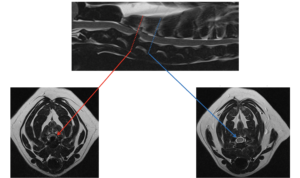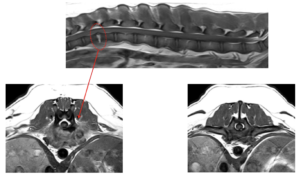Spinal Cord Disease
October 28, 2020
Written by: Izumi Toyoda, DVM, Residency Trained in Neurology, Ph.D.
In neurology service, we see many patients with spinal cord disease. The spinal cord is like an electric cable, connecting the brain and the rest of the body via electric signals! When transmission of electric information is interrupted due to spinal cord disease, it results in clinical signs such as back pain, difficulty walking/standing, or lack of sensation to the limbs.
There are many diseases that affect spinal cords, such as trauma, infection, immune-mediated inflammation, tumors, intervertebral disc herniation, degenerative, congenital, or developmental disease, just to name a few. A patient’s age, breed, history, and clinical exam findings would allow us to narrow down our list of differentials. However, we would need further diagnostics such as MRI, CT, cerebrospinal fluid (CSF) analysis, biopsy, or sometimes electrophysiological studies to understand the underlying cause of the clinical signs and to decide on the best course of therapy for each patient.
Examples
Let’s look at three examples.
All three patients (age 2-6 years old) were presented to the Neurology Service at Vista Veterinary Specialists for clinical signs of spinal cord issues, ranging from difficulty walking on pelvic limbs with no pain (patient #1), neck pain and difficulty walking (patient #2), or only back pain (patient #3). They all had normal bloodwork and thoracic radiographs.
- Finn
- Daisy
- Abby
Finn, a 2-year-old Biewer Terrier
Diagnosis: Meningomyelitis (immune-mediated inflammatory disease of spinal cord and meninges)
Treatment: Immunosuppressive therapy with steroid

Abby, a 6-year-old Dachshund
Diagnosis: Type I Intervertebral Disc Disease at C3-C4
Treatment: Ventral decompression surgery (“ventral slot”)

Spinal cord is compressed by herniated disc (left). Normal spinal cord without compression (right).
Daisy, a 4-year-old Pit Bull mix
Diagnosis: Bacterial discospondylitis at T12-T13
Treatment: Long-term antibiotics and pain medications

Affected intervertebral disc and surrounding tissue show evidence of inflammation and marked reaction (left). Normal vertebra (right).


